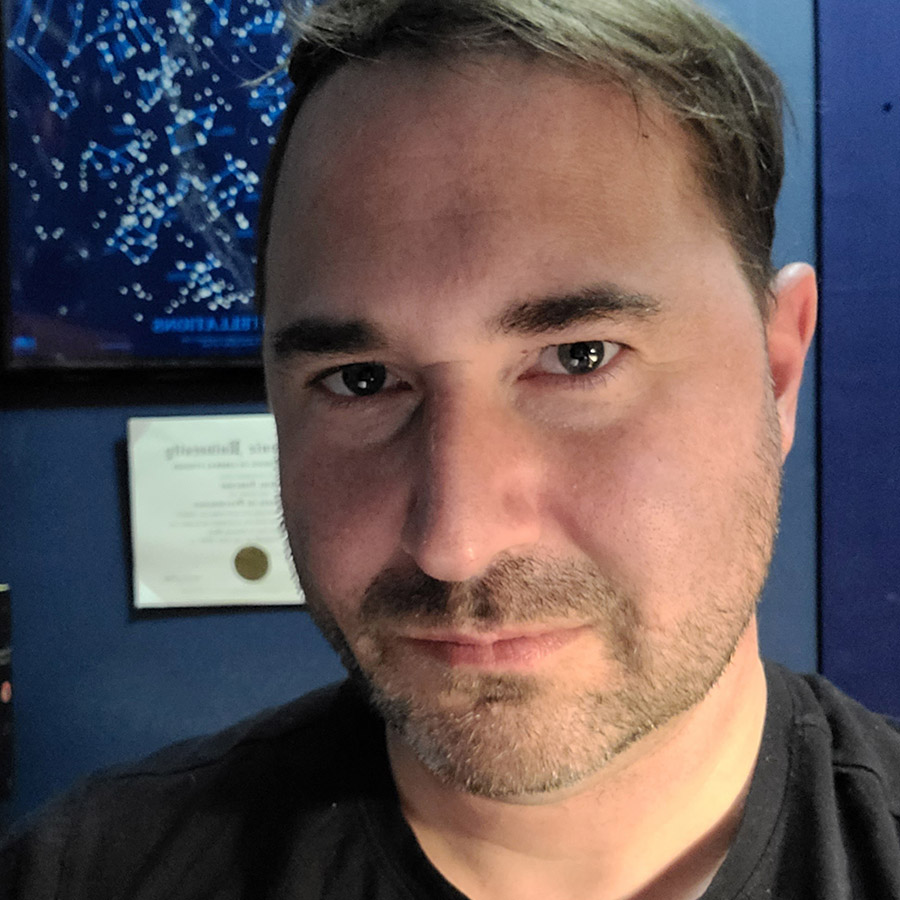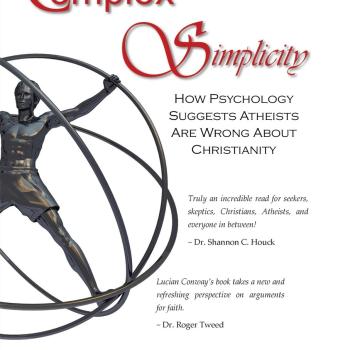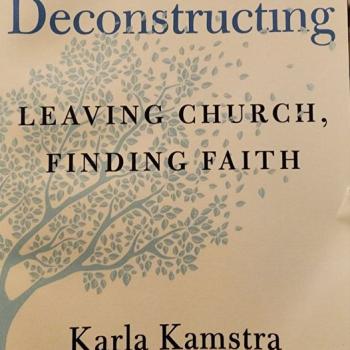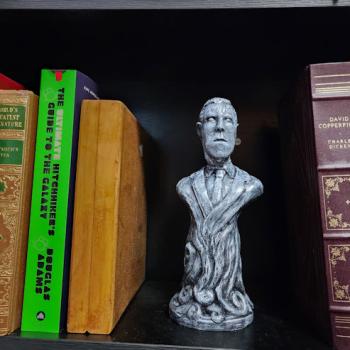
Dr. Daniel Fincke has his PhD in philosophy from Fordham University and spent 11 years teaching in college classrooms. He wrote his dissertation on ethics. Daniel was born and raised on Long Island in a nominally Catholic home, although his father was personally agnostic.
Daniel’s Journey to Belief
When Daniel was five, his parents sent his brother – 8 years his senior – to an evangelical church camp. It was at this camp that Daniel’s brother became deeply convicted, got baptized, and announced to his parents that he was going to begin attending an Evangelical church.
Hesitant but supportive, his parents took him to the church, and his mother warmed to the friendly and inviting environment of the church, and became, herself, an Evangelical believer.
Despite his agnosticism, Daniel’s father did not discourage Daniel’s fervent interest in Christianity.
Daniel was a rule-follower, but also a precocious kid, investigating things that interested him and speaking his mind thanks to his parents who encouraged him to pursue his interests, and didn’t adhere to strict authoritarianism. Says Fincke:
“I speculate that I internalized Christianity so deeply when I was young because I was a good kid and I was powerfully indoctrinated that goodness itself was bound up with the Christian faith. The most trusted authority figures in my life all insisted on the absolute and necessary truth of Christianity.”
Daniel’s childhood faith was bound up in a strictly Christian environment. He would go to church and to Bible Camps where he says he was isolated and indoctrinated. As a young adult, Daniel’s brother became a minister, and Daniel was baptized at his brother’s hands. Daniel’s brother had become an inspiration and model to Daniel. He had overcome learning disabilities and speech impediments to go to college, graduate, marry a beautiful woman, become a virtuous minister, and raise a loving Christian family.
True to his convictions to allow Daniel freedom to pursue his interests, Daniel’s agnostic father accompanied him on a mission trip to Costa Rico, because Daniel’s mother would not allow him to go alone. But Daniel was not entirely isolated. He attended public school and went away on trips that weren’t sponsored by Church or Christian communities. On these trips he was bullied, but he also had close friends, most of whom were Jewish. But because of his deeply held religious beliefs, he felt strongly compelled to evangelize those around him – including close Jewish friends – as a matter of moral duty.
The Trouble with Church Life
But it wasn’t just his non-church friends his faith attended to. He was also keenly aware of the moral failings of his Christian friends who, he felt, didn’t always live up to the moral strictures taught him by the church. This constant question of whether those around him were “saved” was an interference with potential romantic engagements. While Daniel developed attraction to and relationships with girls in High School, the fact that they were unchurched – and therefore “unsaved” – was a barrier to beginning any kind of romance.
As he began to mature into adolescence he resented the unholy teachings from secular school about sex and resented his own sexuality because of the guilt it brought to him. Daniel tried to exorcise this guilt through accountability groups and friends, constantly confessing his sins in order to assuage his feelings of being a wretched sinner. This spiraled down into depression and self-loathing, even as he matured into adulthood.
It was during this period in High School, Daniel became convicted that he had not sufficiently explored the objections to Christianity, to see if he had answers to these objections. After an abortive start to learning these objections, Daniel abandoned the project because he did not know how to start such a project. When it was time for him to graduate high school, Daniel’s agnostic father helped him to research and find a Christian College much aligned with his specific convictions and ideas.
The Siren Call of Philosophy
Going to college, Daniel’s goal was to graduate with a degree in theology and go on to teach in seminary. It was at this time that Daniel’s father nudged Daniel in the direction of philosophy. He reasoned that the philosophy courses would give him credits toward theology, while widening Daniel’s scope beyond the narrow teachings of the church.
With his exposure to two philosophy classes in his freshman year, Daniel became enamored with the wider world of philosophy, and abandoned his pursuit of theology to focus on his new love of philosophy.
This love of philosophy led him down the path toward his current role: a philosophy professor and atheist blogger. In his first year of philosophy, Daniel encountered the radical skepticism of David Hume. He was intrigued with Hume’s strict empiricism and the fact that there is no way to be certain of the cause-and-effect correlations one sees in the natural world. In his theology classes, Daniel encountered and was persuaded by presuppositionalism: the idea that either one came to knowledge of God by presuppositions imposed by the natural world, or was blocked by rebellion against a knowledge of God. These two ideas became a strange mixture: that one can never really know anything, and that one’s knowledge of God precedes from natural presuppositions began to sound a great deal like blind faith to Daniel.
While Daniel was still very convinced of the truth of Christianity, he could not rationally justify that truth.
Daniel was also exposed to the philosophy of science which said that two rival theories might be able to make sense of the same facts within the framework of those theories. So, any given person’s method of making sense of the facts may not be determined to be true, even though it “fit the facts.”
In his church history courses, Daniel became aware that the doctrines he embraced as absolute were arrived at through counsels and arguments and evolution over a history, which called into question the absolute certainty with which Christians tend to embrace these doctrines. From exposure to these various philosophies, theologies and histories, Daniel came to doubt absolute truth, and Christian absolutism as well.
Daniel’s defense was that all accounts at rationalization of a worldview were equally suspect, so Christianity didn’t suffer any more defeaters than any other worldview. There was no strong worldview for him to embrace, therefore there was no reason to abandon Christianity – relativistic as he was. Daniel also found solace in the fact that his other philosophy friends didn’t seem to be doubting or jumping ship, so Christianity must still be rational in some way.
It was during a road trip with his philosophy-major friends that they all began to tear into the objections to Christianity. Rather than answering these objections, they further tore down the case for Christianity brick-by-brick, almost accidentally. No longer could Daniel rely on the faith of his philosophy friends, who had just helped him to rationally destroy Christianity.
Daniel’s Best Friend
Daniel found solace in consulting with his closest and most pious friend, John. Not only would he discuss his lagging faith, but he would bring his romantic woes to his longsuffering friend, finding peace while confessing broken hearts and shattered expectations. It was in the midst of these romantic discussions when John confessed that he thought he might be gay.
Both Daniel and his friend struggled, as they believed these desires were sinful, but they did not know what to do about them. But Daniel vowed to remain supportive.
Returning from summer vacation, Daniel was surprised to find that his friend, John, had been digging heavily into Nietzsche, and had become a Nihilist over the summer. The two argued, Daniel working from Kierkegaardian presuppositionalism and John from Nietzschean Nihilism, as to how one can ground reason and assure rationality.
Says Fincke:
“I also didn’t and, still don’t, share his fundamentally nihilistic interpretation of atheism. He described that he could imagine coming to a place where, not believing in any ultimate truth or ultimate value, he could wake up one morning and feel no compulsion to move. He would simply stare at the ceiling. And his mother might come in and say, “John, come on, get up!” and he would not move. There would be no purpose to motivate him.”
As for Daniel, he personally thought it would be completely rational to go on loving and living without a God, because, in his words, he didn’t require a divine being to “rubber stamp” his goals and feelings.
Nevertheless, Daniel’s relationship with John became a deep emotional strain. Daniel tried to be supportive, but John had so much emotional torment as he lusted after other men, but his religious beliefs forbade him from pursuing any gay relationships. Keeping his secret and dealing with the pain that John piled on him with great frequency pushed Daniel to despair.
This chain of events peaked when John’s roommates found an incomplete suicide note on John’s computer. This resulted in some attempts to intervene on behalf of John’s friends and faculty – which pushed a wedged in between Daniel and his friend.
The Straw that Broke the Camel’s Back
What Daniel brought away from his interactions with John was a certain aura of mystery surrounding the works of Nietzsche. Seeing a dichotomy that placed Kierkegaard and Nietzsche at odds, Daniel felt he had to choose between the two, and thusly, between Christianity and Atheism.
When Daniel finally dived into Nietzsche, the thing that struck him was, in his own words:
“…beliefs were matters of moral and intellectual conscience. It was irresponsible to believe anything without knowing, conscientiously and scrupulously, that it was rationally justifiable.”
Internalizing this notion, Daniel became ashamed of irrationally cleaving to his God-beliefs when they could not, in his view, be rationally justified.
This feeling of shame was strongly connected to his treatment of his closest friend: discouraging his friend’s identity as a gay man because of his irrational commitment to his faith. He realized that his beliefs were not merely unjustified, but they were also damaging, and they had been partially responsible for his friend’s flirtation with suicide. His pious beliefs were not merely wrong: they were evil.
After three years of working toward his undergraduate degree in philosophy, Daniel finally left the faith and officially considered himself an atheist.
The Struggle of Being Atheist
Even after leaving the faith, Fincke felt as if he had to justify his decision to the church – appealing to the morality he once held to prove that this wasn’t his rebellion toward God or his sin nature, but rather a rational trip toward the correct conclusion – Christianity didn’t hold up to the light of reason. He was pursuing the truth, not falling into sin.
These attempts to justify his apostacy to the church lasted for seven full years before Fincke awoke to the absurdity of this desire to do so. He owed the church no explanation or justification based on standards he had fully rejected in his pursuit of truth.
Says Fincke:
“Like an unloved child determined to prove himself to parents who didn’t deserve a lick of his energies, I was hellbent on explicating in meticulous detail precisely the psychological, epistemological, and ethical necessity that loving Truth should lead to abandoning Christianity.”
Looking back upon his faith, it is this Christian claim to have special insight – and, in fact, guardianship – into the “truth” of reality that he finds repulsive.
It was out of this milieu that Fincke’s doctoral dissertation on Nietzsche immerged. He had become attracted to Nietzsche’s philosophies and teachings on the nature of morality and religion, which struck a strong chord in his mind as he reflected on the failures he had seen in the faith of his upbringing.
Now Fincke has worked to shed entirely the moral impulses and teachings of his childhood, becoming a brand-new man free from all such foundations.
This continues to strain his relationship with his preacher brother and religious family and friends, but it has ultimately been fully liberating to him.
Now, Dr. Daniel Fincke has his PhD in philosophy from Fordham University and spent 11 years teaching in college classrooms.














